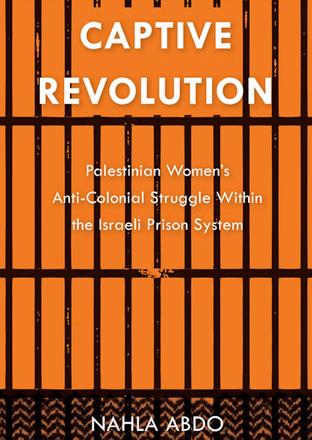You are here
Makers of history behind bars
By Sally Bland - Nov 23,2014 - Last updated at Nov 23,2014

Captive Revolution: Palestinian Women’s Anti-Colonial Struggle within the Israeli Prison System
Nahla Abdo
London: Pluto Press, 2014
Pp. 250
In “Captive Revolution”, Nahla Abdo aims “at making audible the hidden voices… of women political detainees while simultaneously raising international awareness of the plight of over 5,000 Palestinian political prisoners who currently suffer torture and inhumane treatment in Israeli prisons.” (p. 1)
For Palestinian female detainees from the 1960s to 1980s, the period the book focuses on, the silencing was double. Not only were women’s struggles largely lost in official, nationalist histories; even feminist writing mainly ignored Palestinian women militants turned detainees until the First Intifada.
Abdo’s valuable contribution towards reversing this silencing is based on research she conducted in 2007-2009, including in-depth interviews with 17 Palestinian women political ex-detainees and a focus group with 14 women participants, from different parts of the West Bank. By bringing their stories of struggle and torture to light, the book challenges Israel’s image as a democracy and Western perceptions of anti-colonial fighters as terrorists and misfits.
The world situation was quite different when these women took the decision to engage in armed struggle. In the 1960s, there was an international revolutionary current which influenced the Palestinian resistance movement along with other national liberation movements.
The international community, embodied in the United Nations, recognised the right of oppressed peoples to struggle against colonialism. However, imperialism has changed tactics, and especially after September 11th, Orientalist stereotypes and the “terrorist” label have been increasingly applied to those resisting colonialism and oppression, and most particularly to Arabs and Muslims.
Some prominent Western feminists, having previously ignored Palestinian female militants, began to derive distorted theories about their struggle, focusing on suicide bombers. It was claimed that these women engaged in struggle in order to reverse their subjugation in a conservative society, or to cleanse their family honour, or that they were manipulated by men. In the same vein, liberal Western feminists “suddenly discovered Afghani and Iraqi women during the imperialist wars against these two countries and began to talk about the need to ‘emancipate’ or ‘save’ them”. (p. 51)
Not without reason, Abdo argues that this type of feminism moved beyond Orientalism to being full-blown imperialist feminists, justifying imperial wars and plunder — and, on the other hand, denying women’s agency which should be at the heart of feminism.
In contrast, Abdo’s interviews reveal a group of women who took an independent, conscious, political decision to struggle against Israel due to their attachment to Palestine, and their experience of Israel’s destruction of Palestinian homes and lives. Almost all the detainees interviewed had excellent relations with their families, including the male members, and felt that their families had been supportive of their political commitment.
Most all of them were well-educated, secular leftists, motivated by a desire for freedom and greatly influenced by the prevailing resistance culture to which Abdo devotes a whole chapter, focusing on Ghassan Kanafani, Mahmoud Darwish and Tawfiq Zayyad.
Extensive quotes from the ex-detainees themselves document the racist treatment and torture, including sexual torture, to which they were subjected, as well as how they resisted breaking down.
One gets first-hand insight into what motivated these women, how they organised themselves in prison, supported each other, carried out educational programmes and engaged in acts of individual and collective resistance, such as work stoppages and hunger strikes, as well as the disappointments they faced upon release. “Women in prison increased their gender and even feminist consciousness and considered themselves more free and liberated than most other Palestinian women, yet when released they found life outside to have hardly changed in its traditional and patriarchal orientation.” (p. 197)
Nahla Abdo is an Arab feminist activist and Professor of Sociology at Carleton University, Ottawa, Canada, who was once herself a political detainee. In this book, she offers a useful analysis of imperialism today, as well as much information about the Palestinian national movement and the culture of resistance.
Most of all, she fulfils her aim to restore the “histories of women militant fighters turned political detainees by reintegrating them into their proper ‘public’ space as participants, agents, and makers of history”. (p. 3)
Related Articles
AMMAN — Palestine’s Commission of Detainees and Ex-Detainees Affairs said on Wednesday that Jordanian prisoner Abdullah Abu Jaber, who is on
AMMAN — A Jordanian imprisoned in Israeli has suspended his hunger strike after 20 consecutive days as government efforts continue to secure
OCCUPIED JERUSALEM — Thousands of Palestinian prisoners are facing systematic abuse and torture in Israeli jails since the war sparked by Ha















